重大版小学英语六年级上册复习资料
重大版小学英语六年级上册复习资料

小学英语六年级上册复习资料Unit1OurTeachers重点词汇:young 年轻的thin瘦的;苗条的kind 好心的old 年老的active 活跃的clever 聪明的handsomefriendly英俊的友好的prettyfunny漂亮的有趣的相关词汇:tall 高的short 矮的strong 强壮的beautiful美丽的looklike 看起来像;看上去像重点句型:1. ---Whatdoesyourunclelooklike? 你的叔叔长什么样?---He’stallandhandsome. 他又高又帅。
2. ---Whatdoesshelooklike? 她长什么样?---She’sthinandpretty. 她又瘦又漂亮。
3. Heistallandstrong,alsoheisveryfriendly.他又高又壮,而且他非常友好。
Unit2MonthsofaYear重点词汇:January (Jan.) 一月February (Feb.) 二月March (Mar.) 三月April(Apr.)四月May(May)五月June (Jun.) 六月July(Jul.) 七月August(Aug.)八月September(Sept.)九月October(Oct.)十月November(Nov.)十一月December(Dec.)十二月first(1st)第一second(2nd)第二third (3rd) 第三fourth(4th)第四fifth (5th) 第五sixth (6th) 第六seventh(7th)第七eighth(8th) 第八ninth (9th) 第九twelfth(12th)第十二twentieth(20th)第二十twenty-first (21th)第二十一重点句型:1. ---Whenistheschooltrip? 学校旅行是什么时候?---It’sinSeptember. 它在九月份。
六年级上册英语1~3单元重点知识
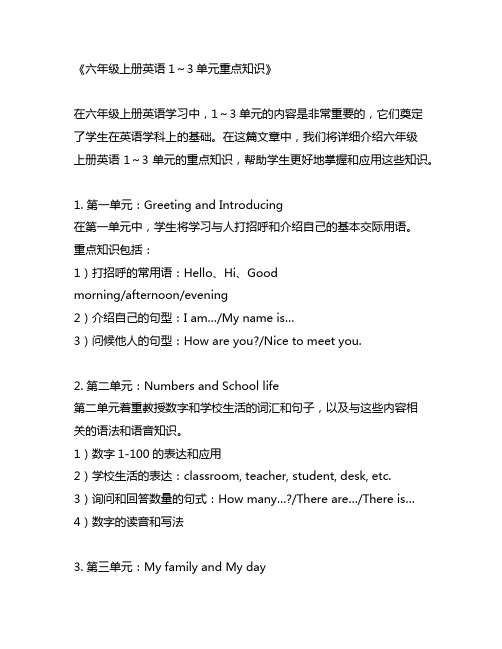
《六年级上册英语1~3单元重点知识》在六年级上册英语学习中,1~3单元的内容是非常重要的,它们奠定了学生在英语学科上的基础。
在这篇文章中,我们将详细介绍六年级上册英语1~3单元的重点知识,帮助学生更好地掌握和应用这些知识。
1. 第一单元:Greeting and Introducing在第一单元中,学生将学习与人打招呼和介绍自己的基本交际用语。
重点知识包括:1)打招呼的常用语:Hello、Hi、Goodmorning/afternoon/evening2)介绍自己的句型:I am…/My name is…3)问候他人的句型:How are you?/Nice to meet you.2. 第二单元:Numbers and School life第二单元着重教授数字和学校生活的词汇和句子,以及与这些内容相关的语法和语音知识。
1)数字1-100的表达和应用2)学校生活的表达:classroom, teacher, student, desk, etc.3)询问和回答数量的句式:How many…?/There are…/There is…4)数字的读音和写法3. 第三单元:My family and My day在第三单元中,学生将学习如何描述自己的家庭和日常生活。
重点内容包括:1)家庭成员的称呼:father, mother, brother, sister, etc.2)家庭成员关系的表达:This is my…/She is my…3)日常生活的描述:get up, have breakfast/lunch/dinner, go to bed, etc.4)时间的表达和描述:morning, afternoon, evening, etc.以上是六年级上册英语1~3单元的重点知识,掌握这些知识对于学生来说是非常重要的。
在学习过程中,学生应该注重听、说、读、写的综合训练,同时注重语言环境的营造,培养学生的英语思维和表达能力。
重大版六年级上册英语复习资料

六年级上册英语复习资料重点词汇Unit1:January一月 February 二月 march 三月 April 四月 May 五月 June 六月 July 七月 August八月 September九月 October 十月 November 十一月 December十二月 first 第一second第二 third 第三Unit2library图书馆 teacher’s office教师办公室 canteen食堂 swimming pool 游泳池 gym 体育馆 teaching building 教学楼 playground 操场 garden 花园music room音乐教室 computer room计算机房 art room 美术教室English corner 英语角Unit 3light rail train 轻轨 subway 地铁 taxi 出租车 ship 轮船 museum 博物馆 bookstore 书店 supermarket 超市 Take a walk 散步 take a rest 休息 take a picture拍照 go shopping去购物 go skating去溜冰 go swimming 去游泳Unit4pick采,摘 hurt伤害 light 点火 shoot 射杀 cut砍,切,剪 fight 打架 shout 喊 spit 吐痰 litter 乱扔垃圾Unit5take part in 参加take a trip去旅行take training参加训练go hiking 去远足nature park天然公园Children’s Palace少年宫volunteer 志愿者craft 手工photography 摄影calligraphy 书法交际用语1. A:when is your birthday? 你的生日是什么时候?B: It’s in October. 在十月。
小学六年级英语总复习资料
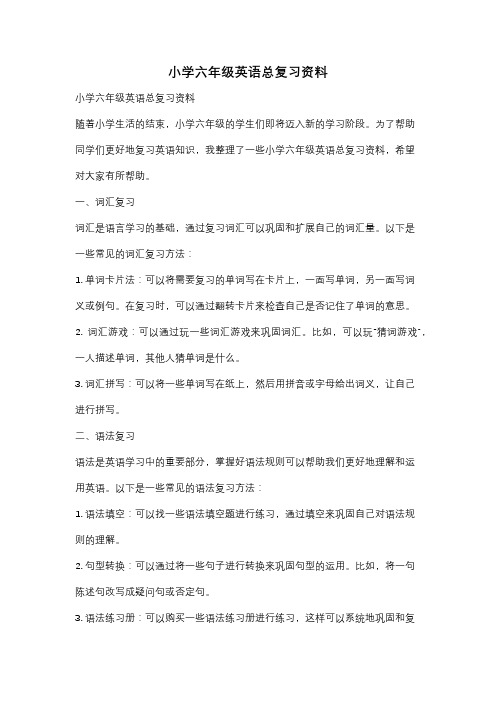
小学六年级英语总复习资料小学六年级英语总复习资料随着小学生活的结束,小学六年级的学生们即将迈入新的学习阶段。
为了帮助同学们更好地复习英语知识,我整理了一些小学六年级英语总复习资料,希望对大家有所帮助。
一、词汇复习词汇是语言学习的基础,通过复习词汇可以巩固和扩展自己的词汇量。
以下是一些常见的词汇复习方法:1. 单词卡片法:可以将需要复习的单词写在卡片上,一面写单词,另一面写词义或例句。
在复习时,可以通过翻转卡片来检查自己是否记住了单词的意思。
2. 词汇游戏:可以通过玩一些词汇游戏来巩固词汇。
比如,可以玩“猜词游戏”,一人描述单词,其他人猜单词是什么。
3. 词汇拼写:可以将一些单词写在纸上,然后用拼音或字母给出词义,让自己进行拼写。
二、语法复习语法是英语学习中的重要部分,掌握好语法规则可以帮助我们更好地理解和运用英语。
以下是一些常见的语法复习方法:1. 语法填空:可以找一些语法填空题进行练习,通过填空来巩固自己对语法规则的理解。
2. 句型转换:可以通过将一些句子进行转换来巩固句型的运用。
比如,将一句陈述句改写成疑问句或否定句。
3. 语法练习册:可以购买一些语法练习册进行练习,这样可以系统地巩固和复习各个语法知识点。
三、阅读理解复习阅读理解是英语学习中的重要技能,通过阅读可以帮助我们提高阅读理解能力和词汇量。
以下是一些常见的阅读理解复习方法:1. 阅读文章:可以选择一些适合自己水平的英语文章进行阅读,通过阅读来提高自己的阅读理解能力。
2. 阅读训练:可以找一些阅读训练题进行练习,通过做题来巩固自己的阅读理解能力。
3. 阅读策略:可以学习一些阅读策略,比如扫读、略读等,这样可以更高效地理解和记忆文章内容。
四、口语练习口语是英语学习中的重要部分,通过口语练习可以提高自己的口语表达能力和听力能力。
以下是一些常见的口语练习方法:1. 对话练习:可以找一个语伴或者同学一起进行对话练习,通过对话来提高自己的口语表达能力。
重大版小学英语六年级上册unit2

Alice: Frank isn’t here today, but his
birthday is on July 4th.
Mr. Smith: Thank you, Alice. And Eric?
Eric:
My birthday is on January 17th.
Mr. Smith: On January 17th. OK. And Jane,
Mr. Smith: Now, Alice, how old are you?
Alice: I’m thirteen.
Mr. Smith: When is your birthday?
Alice: It’s on September 5th, Mr. Smith.
Mr. Smith: Oh, OK. And how about Frank?
_A_u_g_u_s.t 10.Halloween(万圣节) is in _N_o_v_e_m__b_e_r.
The first month of a year is second third fourth fifth sixth seventh eighth ninth tenth eleventh twelfth
1. Spring Festival (春节)is in _J_a_n_u_a_ry___ or _F_e_b_r_u_a_ry. 2. Tree Planting Day (植树节)is in _M__ar_c_h__.
3. Mother’s Day is in __M_a_y__. 4. National Day (国庆节)is in _O_c_t_o_b_e_r_. 5. Teachers’ Day is in _S_e_p_te_m__b_e.r 6. Christmas Day is in _D_e_c_e_m__b_e_r . 7. April Fool’s Day (愚人节)is in _A_p_r_il____. 8. Children’s Day (儿童节) is in _J_u_n_e____. 9. Students have summer holiday(暑假) in _J_u_ly__ and
重大版小学英语六年级上册复习资料

dancing 跳舞
drawing
画画
readingbooks
playingtabletennis
打乒乓球
打篮球
playingfootball
踢足球
看书
重点句型: 1. ---Doyouhaveanyhobbies ?
---Yes,Ido.Ilikeclimbingrocks. 2. Ilikecollectingstamps. 3. Shelikesmakingthings. 4. Helikesrunningandreading.
taketennislessons
上网球课
buybooks tomorrow
买书 明天
nextSunday
下个星期天
相关词汇: begoingtodosth.
打算做某事;要做某事
重点句型: 1. ---Whatareyougoingtodothiswinterholiday?
---I ’ mgoingtotraveltoBeijing. 2. ---Areyougoingtosingsongstomorrow?
---YoucangotherebyNo.906bus.
Unit5
OurHolidayPlans
重点词汇:
traveltoBeijing
去北京旅游
visitmyaunt
看望阿姨
today
今天
thisSunday
这个星期天
你怎样去上学? 我经常坐公共汽车上学。 我怎么到电影院?
你可以坐 906 路公交车去那里。
七月
September(Sept.) 九月
November(Nov.) 十一月
六年级上册英语一到六单元知识总结
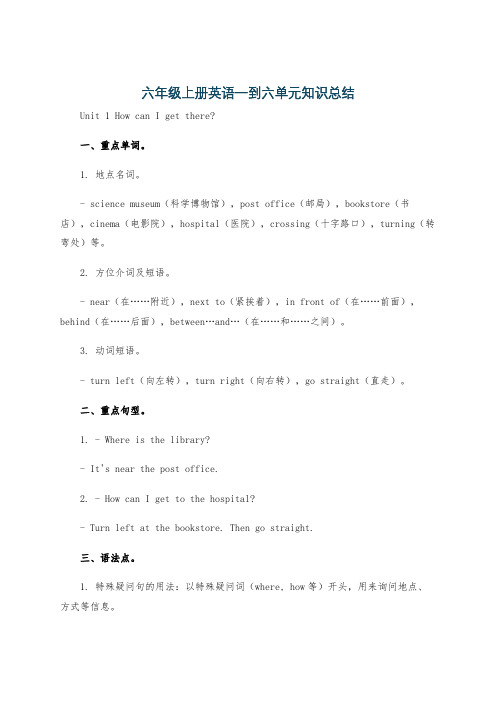
六年级上册英语一到六单元知识总结Unit 1 How can I get there?一、重点单词。
1. 地点名词。
- science museum(科学博物馆),post office(邮局),bookstore(书店),cinema(电影院),hospital(医院),crossing(十字路口),turning(转弯处)等。
2. 方位介词及短语。
- near(在……附近),next to(紧挨着),in front of(在……前面),behind(在……后面),between…and…(在……和……之间)。
3. 动词短语。
- turn left(向左转),turn right(向右转),go straight(直走)。
二、重点句型。
1. - Where is the library?- It's near the post office.2. - How can I get to the hospital?- Turn left at the bookstore. Then go straight.三、语法点。
1. 特殊疑问句的用法:以特殊疑问词(where, how等)开头,用来询问地点、方式等信息。
2. 一般现在时在问路指路中的运用。
Unit 2 Ways to go to school.一、重点单词。
1. 交通工具名词。
- by bike(骑自行车),by bus(乘公共汽车),by train(乘火车),by plane(乘飞机),on foot(步行),ship(轮船),subway(地铁)等。
2. 形容词。
- slow(慢的),fast(快的)。
3. 其他。
- traffic(交通),traffic lights(交通灯),stop(停),wait(等)。
二、重点句型。
1. - How do you come to school?- Usually, I come on foot.2. - How can I get to the Fuxing Hospital?- Take the No. 57 bus over there.三、语法点。
(完整word版)重大版小学英语六年级(上)复习资料

重大版小学英语六年级(上)复习资料一、重点单词参见重大版小学英语六年级(上)P65-67词汇表,词语分为黑体、有星号以及其他这三大类,请按照上面附注要求进行复习。
二、重点句型A:when is your birthday? 你的生日是什么时候?B: It’s in October. 在十月。
A: What’s the date today? 今天是几月几日?B:January 1st 一月一日。
A:Where is the libruary? 图书馆在哪里?B: It’s on the second floor. 在二楼。
A:How large and bright! 好大好明亮!A: Where are you going? 你要去哪里?B: I’m going to the art room. 我要去美术室。
A:Really? May I go with you? 真的吗?我能够和你一起去吗?B:Sure. 当然可以。
A:How do you go to the museum? 你怎么去博物馆?B:By bus. 乘公共汽车。
A:How does your sistre go to school? 你姐姐怎么去上学的?B;Sometimes by taxi, sometimeson foot. 又是坐出租车,有时走路。
A: Let’s take a walk. 我们去散步吧。
B:OK. Let’s go. 好,我们去吧。
A:What does this sign mean? 这个标志是什么意思?B: Don’t pick flowers.不要摘花。
A: It’s good to plant trees. 植树有益。
B: It’s bad to cut trees. 砍树有害。
A:We must n’t fight with each other. 我们不能打架。
B:We should love each other. 我们应当相互关爱。
六年级上册1~4单元知识点英语

六年级上册1~4单元知识点英语一、词汇1. 名词复数形式在英语中,名词的复数形式有一定的规则,例如一般在名词末尾加-s或-es,有些名词则需要变换字母形式,如man变为men,child变为children等。
2. 动词的时态英语动词的时态包括一般现在时、一般过去时、一般将来时等。
学生需要掌握动词的不同时态形式及其用法。
3. 形容词和副词形容词用来修饰名词,而副词则用来修饰动词、形容词或者其他副词。
学生需要了解形容词和副词的用法,掌握其比较级和最高级的变化规律。
4. 代词代词用来代替名词,分为人称代词、物主代词、指示代词等。
学生需要熟练掌握不同类型代词的用法和变化。
5. 介词短语介词短语是由介词和宾语组成的词组,用来表示名词或代词与其他部分之间的关系。
学生需要学习介词短语的基本用法及常见搭配。
6. 情态动词情态动词用来表达说话人的态度、能力、意愿等,包括can、could、may、might、should、shall、will、would等。
学生需要掌握情态动词的用法及其不同意义。
7. 数词数词用来表示数量,包括基数词和序数词。
学生需要学会基数词和序数词的用法及其变化规则。
二、语法1. 一般现在时一般现在时表示经常性、习惯性的动作或客观事实。
句子的肯定形式中,主语加动词原形;否定形式中,在动词前加助动词do或does,并在动词后加not;疑问形式中,助动词do或does置于主语之前。
2. 一般过去时一般过去时表示过去某个时间里发生的动作或状态。
句子的肯定形式中,动词变为过去式;否定形式中,在动词前加助动词did,并在动词后加not;疑问形式中,助动词did置于主语之前。
3. 一般将来时一般将来时表示将来某个时间或某个时间的系列动作。
句子的肯定形式中,将来时态由助动词shall或will加动词原形构成;否定形式中,在助动词后加not;疑问形式中,将来时态由助动词shall或will置于主语之前。
4. 句子的基本结构英语句子的基本结构由主语、谓语和宾语构成。
六年级英语上册重点笔记
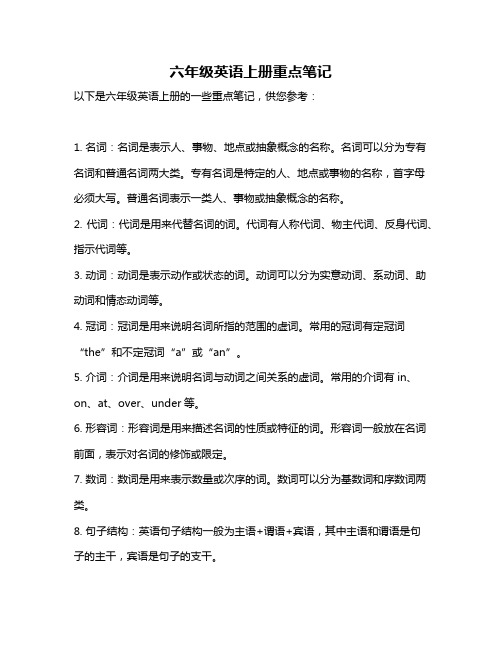
六年级英语上册重点笔记
以下是六年级英语上册的一些重点笔记,供您参考:
1. 名词:名词是表示人、事物、地点或抽象概念的名称。
名词可以分为专有名词和普通名词两大类。
专有名词是特定的人、地点或事物的名称,首字母必须大写。
普通名词表示一类人、事物或抽象概念的名称。
2. 代词:代词是用来代替名词的词。
代词有人称代词、物主代词、反身代词、指示代词等。
3. 动词:动词是表示动作或状态的词。
动词可以分为实意动词、系动词、助动词和情态动词等。
4. 冠词:冠词是用来说明名词所指的范围的虚词。
常用的冠词有定冠词“the”和不定冠词“a”或“an”。
5. 介词:介词是用来说明名词与动词之间关系的虚词。
常用的介词有in、on、at、over、under等。
6. 形容词:形容词是用来描述名词的性质或特征的词。
形容词一般放在名词前面,表示对名词的修饰或限定。
7. 数词:数词是用来表示数量或次序的词。
数词可以分为基数词和序数词两类。
8. 句子结构:英语句子结构一般为主语+谓语+宾语,其中主语和谓语是句
子的主干,宾语是句子的支干。
9. 句子类型:英语句子可以分为陈述句、疑问句和祈使句三大类。
陈述句用来陈述事实或观点;疑问句用来提出问题;祈使句用来发出命令或请求。
10. 时态:时态是用来表示动作发生的时间和方式的语法形式。
英语中常用的时态有现在时、过去时、将来时等。
六年级上册英语知识梳理笔记
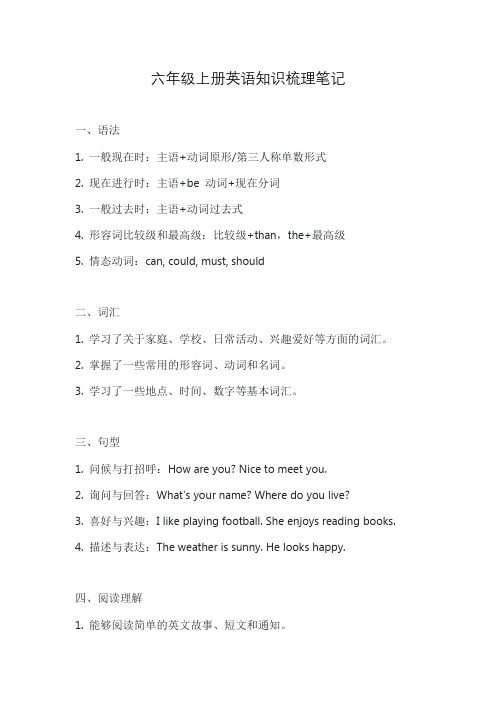
六年级上册英语知识梳理笔记
一、语法
1. 一般现在时:主语+动词原形/第三人称单数形式
2. 现在进行时:主语+be 动词+现在分词
3. 一般过去时:主语+动词过去式
4. 形容词比较级和最高级:比较级+than,the+最高级
5. 情态动词:can, could, must, should
二、词汇
1. 学习了关于家庭、学校、日常活动、兴趣爱好等方面的词汇。
2. 掌握了一些常用的形容词、动词和名词。
3. 学习了一些地点、时间、数字等基本词汇。
三、句型
1. 问候与打招呼:How are you? Nice to meet you.
2. 询问与回答:What's your name? Where do you live?
3. 喜好与兴趣:I like playing football. She enjoys reading books.
4. 描述与表达:The weather is sunny. He looks happy.
四、阅读理解
1. 能够阅读简单的英文故事、短文和通知。
2. 理解主要内容和细节。
3. 回答关于阅读材料的问题。
六年级上册英语1-4单元必考知识点总结

Unit 3 What are you going to do?
一.词汇 'next week 下周
newsp叩er 报纸
this morning 今天上午
comic book漫画书
Time: (时间)
this afternoon 今天下午 this evening今天晚上
magazine 杂志 dictionary 字典
make kites (making kites )制作风筝 colLect stamps (collecting stamps)集邮
三单
Live (lives)居住,住 teach (teaches)教 go (goes)去 watch (watches)看 read (reads)读
其他show (展览)
(交通工具前加by,表示乘坐但步行要用on foot)
三会一
fifth第五 difference 不同 country 国家 right右边的 Australia澳大利亚 if如果
remember 记住 same相同的 mean意思是
side 边 however 但是 must必须
find找到 every每个所有的 drive驾驶
do (does) pen pal(笔友)
dear (亲爱的)
look(看上去)fun(快乐,乐趣)
with(同…)
三、重点句型:
1 .询问某人的爱好:
---------- What's your hobby?你的爱好是什么?
-----------1 Like collecting stamps.我喜欢集邮 2 .表示征求别人意见:
我坐飞机去。
■ ----------- How does your father go to work? ----------- He goes to work by subway.
六年级上册英语1~3单元知识点归纳

第一部分:主题介绍1. 介绍六年级上册英语1~3单元的整体内容和主题概况六年级上册英语的1~3单元主要围绕着日常生活、家庭、学校等主题展开,涵盖了日常用语、问候语、家庭成员、学校活动等内容。
这些内容对学生的英语基础知识和实际运用能力都具有重要意义。
接下来,我们将深入探讨这些知识点的具体内容和重点难点。
第二部分:知识点详解2. 介绍日常用语和常用问候语在日常生活中,人们经常使用的问候语和日常用语是非常重要的。
比如“Hello, how are you?”, “Goodmorning/afternoon/evening.”等等,这些简单的用语非常基础,但也是人们最常用的口语表达方式。
3. 家庭成员介绍在家庭主题中,学生需要学习家庭成员的称呼和介绍。
比如father, mother, brother, sister, grandmother, grandfather等等。
这些单词对于学生来说是基本的家庭成员概念,同时也对于日常生活中的交流有着重要作用。
4. 学校生活和活动介绍学校生活和活动也是学生们日常生活中的主要内容。
学生需要学习一些学校相关的单词和句型,比如school, teacher, student, class,study, play等等。
同时也需要了解一些学校活动的表达方式,比如“I like to play soccer with my friends after school.” “We have an English class every Monday.”等等。
第三部分:总结回顾5. 对知识点进行总结和回顾通过本文的介绍,我们可以看到六年级上册英语1~3单元的知识点涵盖了日常生活、家庭、学校等主题,内容丰富而实用。
学生们需要掌握的基本口语表达和词汇量很大,但也是非常基础的英语知识。
理解这些知识点不仅对学生的英语学习有帮助,也能够在日常生活中更好地应用和交流。
6. 个人观点和理解个人认为,六年级上册英语1~3单元的知识点是非常基础而实用的,对学生的英语水平提升有着重要作用。
六年级上册英语重点笔记
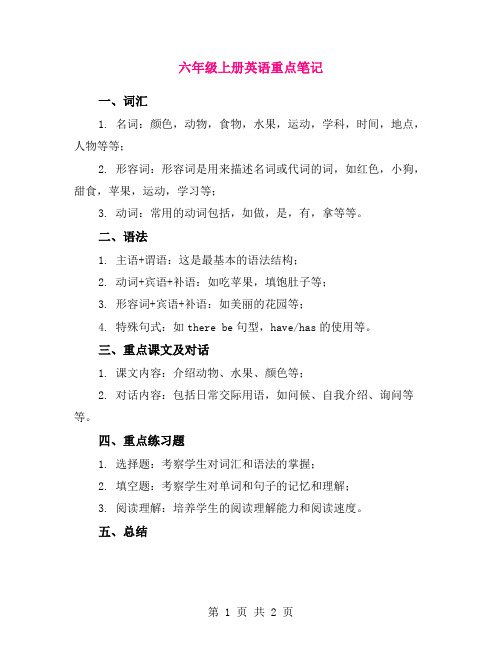
六年级上册英语重点笔记
一、词汇
1. 名词:颜色,动物,食物,水果,运动,学科,时间,地点,人物等等;
2. 形容词:形容词是用来描述名词或代词的词,如红色,小狗,甜食,苹果,运动,学习等;
3. 动词:常用的动词包括,如做,是,有,拿等等。
二、语法
1. 主语+谓语:这是最基本的语法结构;
2. 动词+宾语+补语:如吃苹果,填饱肚子等;
3. 形容词+宾语+补语:如美丽的花园等;
4. 特殊句式:如there be句型,have/has的使用等。
三、重点课文及对话
1. 课文内容:介绍动物、水果、颜色等;
2. 对话内容:包括日常交际用语,如问候、自我介绍、询问等等。
四、重点练习题
1. 选择题:考察学生对词汇和语法的掌握;
2. 填空题:考察学生对单词和句子的记忆和理解;
3. 阅读理解:培养学生的阅读理解能力和阅读速度。
五、总结
通过以上重点笔记的学习,学生可以更好地掌握六年级上册英语的知识点和技能,为以后的英语学习打下坚实的基础。
同时,也希望学生们能够认真学习,勤于思考,不断提高自己的英语水平。
重大版小学英语六年级上册复习资料

重大版小学英语六年级上册复习资料Unit 1 Our Teachers重点词汇:young年轻的old年老的handsome 英俊的pretty 漂亮的thin瘦的;苗条的active 活跃的friendly友好的funny有趣的kind 好心的clever聪明的相关词汇:tall高的short矮的strong 强壮的beautiful 美丽的look like 看起来像;看上去像重点句型:1.---What does your uncle look like? 你的叔叔长什么样?---He’s tall and handsome. 他又高又帅。
2.---What does she look like? 她长什么样?---She’s thin and pretty. 她又瘦又漂亮。
3.He is tall and strong;also he is very friendly. 他又高又壮;而且他非常友好。
Unit 2 Months of a Year重点词汇:January ( Jan. )一月February ( Feb. )二月March ( Mar. )三月April ( Apr. )四月May ( May )五月June ( Jun. )六月July ( Jul. )七月August ( Aug. )八月September ( Sept. )九月October ( Oct. )十月November ( Nov. ) 十一月December ( Dec. ) 十二月first ( 1st )第一second ( 2nd)第二third ( 3rd )第三fourth ( 4th )第四fifth ( 5th)第五sixth ( 6th )第六seventh ( 7th )第七eighth ( 8th)第八ninth ( 9th )第九twelfth ( 12th )第十二twentieth ( 20th)第二十twenty-first ( 21th )第二十一重点句型:1.---When is the school trip? 学校旅行是什么时候?---It’s in September. 它在九月份。
六年级上册英语复习资料
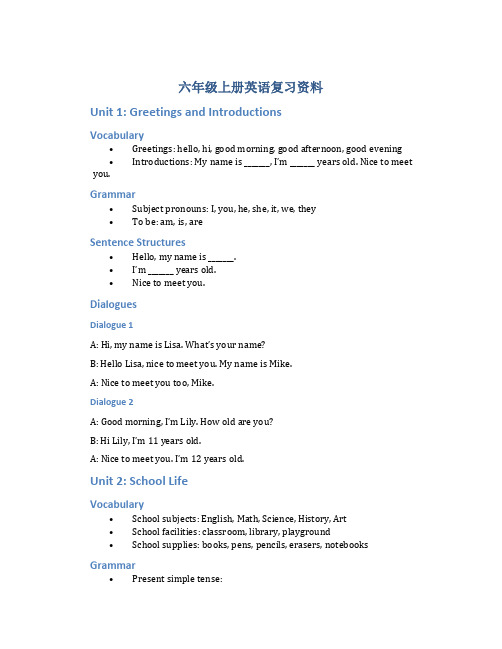
六年级上册英语复习资料Unit 1: Greetings and IntroductionsVocabulary•Greetings: hello, hi, good morning, good afternoon, good evening •Introductions: My name is _______, I’m _______ years old. Nice to meet you.Grammar•Subject pronouns: I, you, he, she, it, we, they•To be: am, is, areSentence Structures•Hello, my name is _______.•I’m _______ years old.•Nice to meet you.DialoguesDialogue 1A: Hi, my name is Lisa. What’s your name?B: Hello Lisa, nice to meet you. My name is Mike.A: Nice to meet you too, Mike.Dialogue 2A: Good morning, I’m Lily. How old are you?B: Hi Lily, I’m 11 years old.A: Nice to meet you. I’m 12 years old.Unit 2: School LifeVocabulary•School subjects: English, Math, Science, History, Art•School facilities: classroom, library, playground•School supplies: books, pens, pencils, erasers, notebooksGrammar•Present simple tense:–Positive: I/You/We/They + verb–Negative: I/You/We/They + don’t + verb–Question: Do + I/You/We/They + verb?Sentence Structures•I like _______.•I don’t like _______.•Do you like _______?DialoguesDialogue 1A: What subjects do you have at school?B: We have English, Math, Science, and History.A: That sounds interesting. Which one is your favorite?B: I like Math the most. What about you?A: I like Science.Dialogue 2A: Do you have any school supplies?B: Yes, I have books, pens, and notebooks.A: Do you like drawing?B: No, I don’t like drawing.Unit 3: Family and FriendsVocabulary•Family members: father, mother, brother, sister, grandparents •Friends: friend, best friend•Adjectives to describe people: kind, funny, smart Grammar•Possessive adjectives: my, your, his, her, our, their Sentence Structures•This is my _______.•He/She is my _______.DialoguesDialogue 1A: Who is the person in the picture?B: This is my mother.A: She looks very kind.B: Yes, she is very kind.Dialogue 2A: Who is your best friend?B: His name is Jack. He is very funny.A: That’s great.Unit 4: Daily ActivitiesVocabulary•Daily routine: wake up, get dressed, eat breakfast, go to school, have lunch, do homework, go to bed•Adverbs of frequency: always, often, sometimes, rarely, never Grammar•Present simple tense:–Positive: He/She/It + verb + s/es–Negative: He/She/It + doesn’t + verb–Question: Does + He/She/It + verb?Sentence Structures•I usually _______.•He/She always _______.•Does she _______?DialoguesDialogue 1A: What time do you usually wake up?B: I usually wake up at 7 o’clock.A: And when do you go to bed?B: I usual ly go to bed at 9 o’clock.Dialogue 2A: Does your brother do his homework every day?B: No, he rarely does his homework.A: Oh, that’s not good.Unit 5: Food and DrinksVocabulary•Food: bread, rice, noodles, chicken, beef, fish, vegetables, fruits •Drinks: water, milk, juice, tea, coffeeGrammar•Countable and uncountable nouns:–Countable: I have two _______.–Uncountable: I have some _______.Sentence Structures•I like eating _______.•I don’t like drinking _______.•Do you like eating _______?DialoguesDialogue 1A: What’s your favorite food?B: My favorite food is pizza.A: That sounds delicious.B: Yes, it’s very tasty.Dialogue 2A: Do you drink milk every day?B: No, I don’t like drinking milk.A: What do you drink then?B: I like drinking juice.ConclusionThis document serves as a review material for the content covered in the first semester of the sixth grade English course. It includes vocabulary, grammar, sentence structures, and dialogues from different units. By studying and practicing these materials, students will be able to reinforce their English language skills and prepare for future lessons.。
- 1、下载文档前请自行甄别文档内容的完整性,平台不提供额外的编辑、内容补充、找答案等附加服务。
- 2、"仅部分预览"的文档,不可在线预览部分如存在完整性等问题,可反馈申请退款(可完整预览的文档不适用该条件!)。
- 3、如文档侵犯您的权益,请联系客服反馈,我们会尽快为您处理(人工客服工作时间:9:00-18:30)。
小学英语六年级上册复习资料
Unit 1 Our Teachers
重点词汇:
young年轻的old年老的handsome 英俊的pretty 漂亮的thin瘦的;苗条的active 活跃的friendly友好的funny有趣的kind 好心的clever聪明的
相关词汇:
tall高的short矮的strong 强壮的beautiful 美丽的
look like 看起来像;看上去像
重点句型:
1.---What does your uncle look like? 你的叔叔长什么样?
---He’s tall and handsome. 他又高又帅。
2.---What does she look like? 她长什么样?
---She’s thin and pretty. 她又瘦又漂亮。
3.He is tall and strong, also he is very friendly. 他又高又壮,而且他非常友好。
Unit 2 Months of a Year
重点词汇:
January ( Jan. )一月February ( Feb. )二月March ( Mar. )三月
April ( Apr. )四月May ( May )五月June ( Jun. )六月July ( Jul. )七月August ( Aug. )八月
September ( Sept. )九月October ( Oct. )十月
November ( Nov. ) 十一月December ( Dec. ) 十二月
first ( 1st )第一second ( 2nd)第二third ( 3rd )第三fourth ( 4th )第四fifth ( 5th)第五sixth ( 6th )第六seventh ( 7th )第七eighth ( 8th)第八ninth ( 9th )第九twelfth ( 12th )第十二twentieth ( 20th)第二十
twenty-first ( 21th )第二十一
重点句型:
1.---When is the school trip? 学校旅行是什么时候?
---It’s in September. 它在九月份。
2.---When is your birthday? 你的生日是什么时候?
---My birthday is on June 5th. 我的生日在六月五日。
Unit 3 Our Hobbies
重点词汇:
collecting stamps集邮climbing rocks 攀岩
keeping pets 养宠物taking photos 照相
watching birds 观鸟playing chess 下象棋
making things做手工growing flowers 种花
相关词汇:
hobby 爱好
singing 唱歌dancing跳舞drawing 画画reading books 看书running 跑步playing table tennis 打乒乓球
playing basketball 打篮球playing football 踢足球
重点句型:
1.---Do you have any hobbies?你有什么爱好吗?
--- Yes, I do. I like climbing rocks. 是的,我有。
我喜欢攀岩。
2.I like collecting stamps. 我喜欢集邮。
3.She likes making things. 她喜欢做手工。
4.He likes running and reading. 他喜欢跑步和阅读。
Unit 4 Around Our City
重点词汇:
by bus 坐公共汽车;坐公交车by taxi 坐出租车on foot 步行by bike 骑自行车by train 坐火车by ship 坐轮船by car 坐小汽车bookstore 书店cinema 电影院shop 商店
hospital 医院supermarket 超市
相关词汇:
how 怎样;如何by plane坐飞机go去;走go to school 上学
重点句型:
1.---How do you go to school? 你怎样去上学?
---I often go to school by bus. 我经常坐公共汽车上学。
2.---How can I get to the cinema? 我怎么到电影院?
---You can go there by No. 906 bus. 你可以坐906路公交车去那里。
Unit 5 Our Holiday Plans
重点词汇:
travel to Beijing 去北京旅游take tennis lessons 上网球课
visit my aunt 看望阿姨buy books 买书
today 今天tomorrow 明天
this Sunday 这个星期天next Sunday 下个星期天
相关词汇:
be going to do sth. 打算做某事;要做某事
重点句型:
1.---What are you going to do this winter holiday? 这个寒假你打算做什么?---I’m going to travel to Beijing. 我打算去北京旅游。
2.---Are you going to sing songs tomorrow? 你们明天要唱歌吗?
---Yes, we are. 是的。
